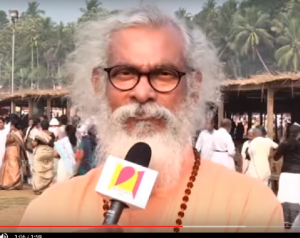Recently, a reader in India sent a clip of a 2012 interview of K.P. Yohannan on Surya TV and Indian station. In it, Yohannan responds to questions about why he did not respond to charges that Believers’ Church acquired Cheruvally Estate (a rubber plantation) illegally. He also claims that the funds to purchase the rubber plantation in 2005 came from donors who designated their donations to the church on the condition that the funds would be used to purchase income producing property.
The clip is mostly in Malayalam. I was able to secure translations by four Malayalam speakers and found them to be nearly the same. Notice that K.P. Yohannan uses some English in his replies. A composite translation is below the video with the time in parentheses after the English words he says.
Anil Nambiar: The Believers Church is the owner of Cheruvally estate.
K.P. Yohannan: Correct (.04)
AN: There is a claim that Cheruvally estate is taken from revenue land.
KP (interrupts): Simply saying…
AN: …this is an allegation from A.M. Varghese
KP: If there is any estate in Kerala that is not owned by the government for the people or does not have any questions about a clear title (.22), that is Cheruvally estate. I take the blame because I did not publically challenge such allegations.
AN: Why didn’t you come out and publicly challenge it?
KP: Stupidity, It was our foolishness (.33). Because there was some advice from people who I respect, “Your highness, don’t reply to these things. Do things straightforwardly, and you are doing that, why fear? Let them say whatever they want.” But like how got beaten up in darkness then woke up, and this is how it is now. I admit, this is a mistake we made (.53) that we didn’t respond. Because we have nothing to fear as we have not done anything wrong.
Estate…when I travel from Thiruvalla to Trivandrum along the way there are so many land, institutions belonging to other churches. How much more property owned by Amrita (a Hindu sect led by a lady guru called “Amma: meaning mother) has how much property? Why did they buy these?
As for Believers’ Church and Cheruvally estate, donors specifically (1:18) have instructed us to establish an income producing entity (1:23), in the future for you to continue your work. Let me ask you, we spend almost 40 crore rupees to take care of 60,000 children – where does this money come from? Can we campaign to raise money all the time? We have to produce our income (1:43), that is what this is for, for that only. Funds for this are literally given to us by the donors for such purposes only. See (1:52) people will ask, “your highness, your sadness (1:58), your sorrow (2:00), what is that?”
I have looked through the donor reports for Gospel for Asia going back as far as 2004 and I can’t find anything specifically donated to allow Believers’ Church to purchase income producing property. In fact, in the 2013 audited financial statement, GFA doesn’t even list Believers’ Church as a related party and recipient of cash from GFA. I suppose it is possible Yohannan referred to donations from within India which are not a part of the U.S. audit. There are many questions raised by this interview.
Those questions aside, Yohannan told one story to Anil Nambiar about the purchase of the Cheruvally Estate and another story on his GFA website. Read what he said there about the acquisition of the plantation:
In addition to generous giving on the part of its members, theese (sic) churches also generate revenue from literature publishing and other activities. When leaders were presented with the opportunity to purchase an operating rubber plantation for only “pennies on the dollar,” they saw a way to open a new income stream for ministry. But there were stipulations on how the purchase would have to be made.
“The leadership made the decision with the understanding that financing would not come from church or mission funds,” explained Dr. K.P. Yohannan, who is also president of Gospel for Asia, whose native missionaries serve the Asian church. “Rather, it would have to be taken care of from the profits of the estate.”
With that understanding, and the knowledge that the property was being “dumped” at a very low price (about US $19 million), the leaders voted to go forward.
“We made the purchase with a 100 percent bank loan at a very favorable rate,” Dr. Yohannan explained. “And now the loan is being repaid with the profits from the rubber plantation. When it is paid for in six or seven years, all further profits will go directly to fund missions and ministries.”
“I gave my full support to the purchase,” Dr. Yohannan added, “because I know that the future of the church in India depends on its ability to take care of itself.
So which is it? Was the plantation purchased with designated donor funds or by means of “a 100 percent bank loan?”
It wouldn’t be far fetched for Believers’ Church to divert funds; an Indian court declared that the church did just that in 2014. But why tell American donors that the plantation was fully purchased with a bank loan? The two different narratives do not inspire confidence or trust.
In this interview, Yohannan discloses that GFA spends around $7 million (40 crore rupees in 2012) on 60,000 Bridge of Hope children. That is about $117/child a year or just shy of $10/month. BoH sponsors in the U.S. send $35/child. Furthermore, if the plantation and other income producing businesses are funding these programs then what is happening to the U.S. donations?
